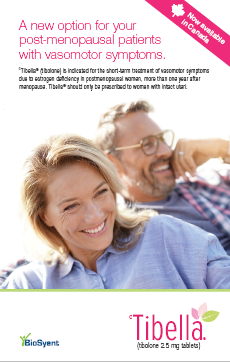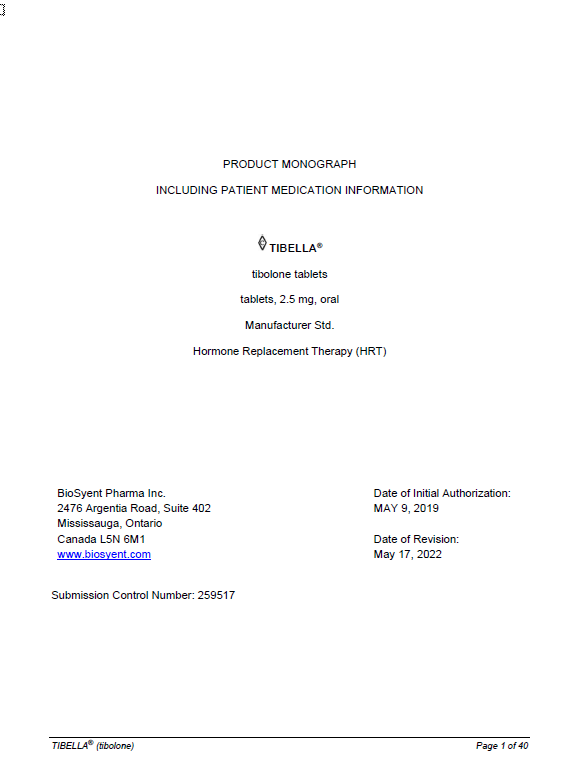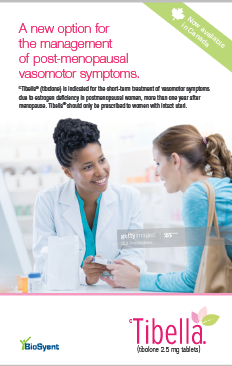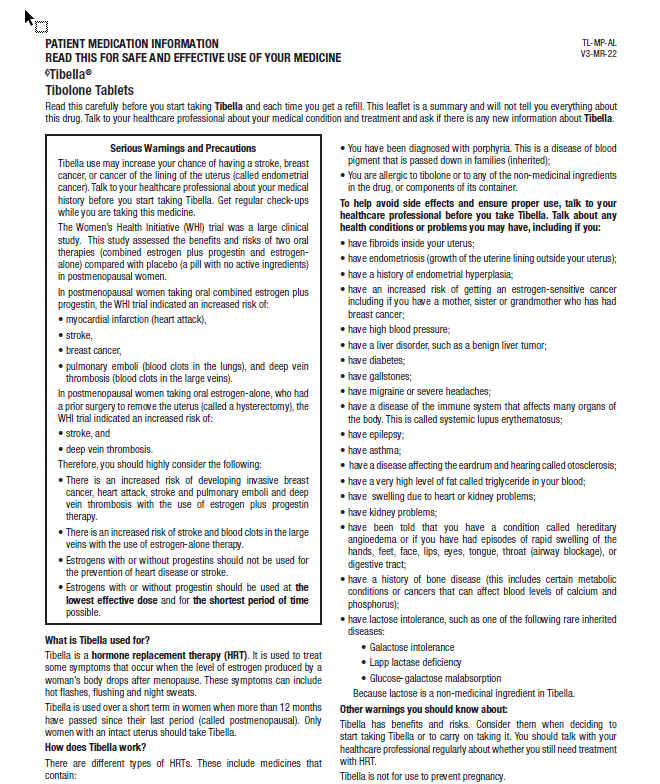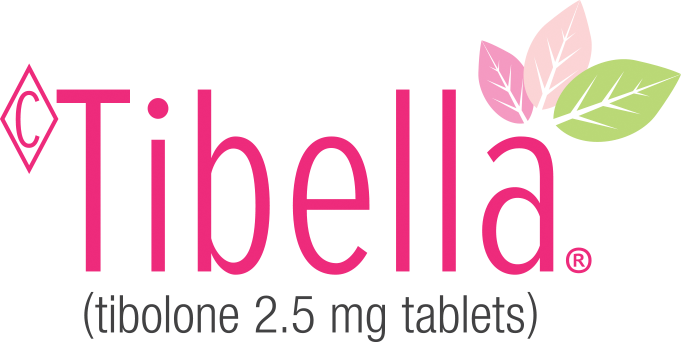
EN | FR
HOME- REGISTER
FOR UPDATES - PHYSICIAN
RESOURCES - PHARMACIST
RESOURCES - PATIENT
RESOURCES - SAFETY
INFORMATION
CONTACT US
LEGAL

 |
Click here for additional safety information and a link to the Product Monograph |
Consult the Tibella® Product Monograph for important information about:
- Contraindications in patients with liver dysfunction or disease or abnormal liver function tests, known or suspected estrogen or progestin-dependent malignant neoplasia, endometrial hyperplasia, past history of breast cancer, undiagnosed abnormal genital bleeding, pregnancy and/or lactation, arterial thromboembolic disease, venuous thromboembolism or active thrombophlebitis, thrombophilic disorders, loss of vision due to ophthalmic vascular disease, porphyria, and hypersensitivity of Tibella® or any of its ingredients or packaging
- Most serious warnings and precautions regarding increase in blood fibrinolytic activity, use of St. John’s wort, risk of stroke, breast cancer and endometrial cancer; use of estrogens with or without progestins
- Other relevant warnings and precautions regarding assessment of risks of stroke, breast cancer and endometrial cancer, close supervision of patients with certain concomitant conditions (including leiomyoma or endometriosis, risk for thromboembolic disorders and estrogen-dependent tumours, hypertension, liver disorders, diabetes mellitus, cholelithiasis, migraine or severe headache, systemic lupus erythematosus, history of endometrial hyperplasia, epilepsy, asthma, otosclerosis), breakthrough bleeding, ovarian cancer, cardiovascular disease, driving and endocrine/metabolism, genitourinary, hepatic/biliary/pancreatic, immune, neurologic, renal, sexual health and pregnancy
- Conditions of clinical use, adverse reactions, drug interactions, and dosing instructions. The product monograph is also available from BioSyent Pharma Inc. at 1-888-439-0013
 Tibella® has Demonstrated1:
Tibella® has Demonstrated1:
- Mechanism of action with weak estrogenic, progestogenic and some androgenic tissue-specific effects*
- Well-established safety and tolerability profile
The most common AEs (≥1/100 –>1/10) included lower abdominal pain, breast tenderness, cervical dysplasia, endometrial thickening, genital pruritis, vaginal/genital discharge, pelvic pain, vaginal candidiasis, vaginal hemorrhage, vulvovaginitis, abnormal hair growth, weight increase and abnormal cervical smear‡ - Simple dosing regimen – one tablet, once daily**
- Significantly reduced vasomotor symptoms (flushing, sweating) vs. placebo. Tibolone was significantly more effective in reducing frequency of hot flushes and reducing sweating episodes vs placebo; p>0.001†
* Clinical significance unknown
** Please see Product Monograph for complete dosing recommendations
‡Please see Product Monograph for complete adverse events
† Landgren et al. Multicentre, double-blind, placebo controlled study in 775 postmenopausal women, randomized to receive tibolone 0.625 mg, 1.25 mg, 2.5 mg, 5.0 mg or placebo daily for 12 weeks. Main outcome measures were hot flushes, sweating, vaginal bleeding and side effects assessed at 4, 8 and 12 weeks. Approved dosage is 2.5 mg daily; 0.625, 1.25 and 5.0 mg doses are not recommended.
** Please see Product Monograph for complete dosing recommendations
‡Please see Product Monograph for complete adverse events
† Landgren et al. Multicentre, double-blind, placebo controlled study in 775 postmenopausal women, randomized to receive tibolone 0.625 mg, 1.25 mg, 2.5 mg, 5.0 mg or placebo daily for 12 weeks. Main outcome measures were hot flushes, sweating, vaginal bleeding and side effects assessed at 4, 8 and 12 weeks. Approved dosage is 2.5 mg daily; 0.625, 1.25 and 5.0 mg doses are not recommended.
Register for Updates
Be the first one to receive the latest news and clinical information on Tibella®
Physician Resources
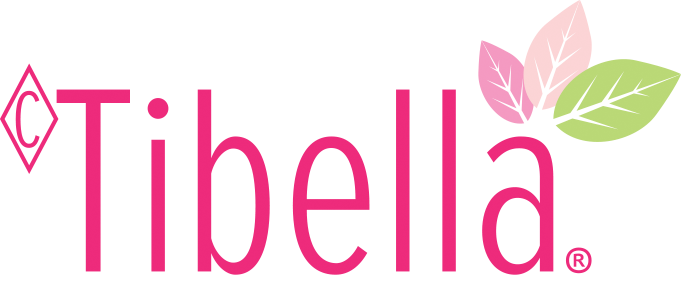
For more information about the Tibella® Patient Financial Assistance Program,
PLEASE COMPLETE THE FOLLOWING FORM

Want to email the Patient Information to your patients?
You can do this in one of two ways:
- Copy link provided above to an email and send email with link directly to your patient or,
-
Click the link to the PDF for the Patient Information. As you move your mouse cursor over the
document, a small toolbar should appear. Once you’ve located the toolbar, click the icon that looks
like a computer diskette or an arrow pointing down to save the PDF file. This can now be emailed as
an attachment directly to your patients.
Safety Information
Clinical Use:The decision to use Tibella® should be based on assessment of the patient’s overall risks, including risk of stroke, particularly in patients over 60 years of age. Tibella® should be prescribed for the shortest duration consistent with treatment goals. Review the need for continuation of treatment after 6 months, taking into account the risk-benefit ratio for the individual user at that moment (including cardiovascular disease, endometrial cancer and breast cancer). Tibella® should only be continued as long as the benefit outweighs the risks. There is no authorized indication for pediatric use (≤18 years).
Contraindications:
- Liver dysfunction or disease with abnormal liver function tests
- Known or suspected estrogen- or progestin-dependent malignant neoplasia
- Endometrial hyperplasia
- Known, suspected, or past history of breast cancer.
- Undiagnosed abnormal genital bleeding
- Known or suspected pregnancy and/or lactation
- Active or past history of arterial thromboembolic disease
- Active or past history of venous thromboembolism or active thrombophlebitis
- Known thrombophilic disorders
- Partial or complete loss of vision due to ophthalmic vascular disease
- Porphyria
- Hypersensitivity to Tibella® or any of its ingredients or packaging
- Tibella® may increase blood fibrinolytic activity therefore enhancing the effects of anticoagulants. This effect has been demonstrated with warfarin.
- St. John’s wort (Hypericum perforatum) may induce the metabolism of estrogens and progestogens via CYP3A4. This may lead to changes in the uterine bleeding profile.
- Stroke: Tibella® may increase the risk of stroke
- Breast cancer: Tibella® may increase the risk of breast cancer
- Endometrial cancer: Tibella® may increase the risk of endometrial cancer in women with an intact uterus, and can be dependent on individual risk factors. A complete personal and family history should be taken before starting treatment; periodic check-ups are recommended while on treatment
- Estrogens with or without progestins:
○ should not be prescribed for primary or secondary prevention of cardiovascular diseases
○ should be prescribed at the lowest effective dose
○ should be prescribed for the shortest period possible for the approved indication
- The risks of stroke, breast cancer and endometrial cancer should be carefully assessed
- Evidence regarding the risks associated with HRT or tibolone in the treatment of premature menopause is limited
- Patients with certain concomitant conditions should be closely supervised:
○ leiomyoma or endometriosis
○ risk for thromboembolic disorders
○ risk for estrogen-dependent tumours
○ hypertension
○ liver disorders
○ diabetes mellitus
○ cholelithiasis
○ migraine or severe headache
○ systemic lupus erythematosus
○ history of endometrial hyperplasia
○ epilepsy
○ asthma
○ otosclerosis - Breakthrough bleeding
- Ovarian cancer
- Cardiovascular disease
- Driving
- Endocrine and metabolism
- Genitourinary
- Hepatic/biliary/pancreatic
- Immune
- Neurologic
- Renal
- Sexual health
- Pregnancy
- Immediate withdrawal of therapy: therapy should be discontinued when a contraindication is discovered, and in the following situations:
○ Jaundice or deterioration in liver function
○ Significant increase in blood pressure
○ New onset of migraine-type headache
○ Pregnancy
Please consult the Tibella® Product Monograph available from Health Canada at https://pdf.hres.ca/dpd_pm/00065924.PDF for important information relating to adverse reactions, drug interactions and dosing information.
REFERENCES: 1. Tibella® Product Monograph, BioSyent Pharma Inc. May 17, 2022. 2. Landgren MB, et al. Dose-response analysis of effects of tibolone on climacteric symptoms. BJOG: An International Journal of Obstetrics and Gynaecology, Oct 2002, Vol.109, pp.1109-1114.


©2024 BioSyent Pharma Inc. |
Contact Us |
Legal Notice



